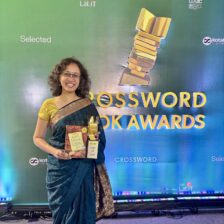I’ve been conducting writing workshops for a long time, and if there’s one thing I love working with, it’s poetry. Nearly every writing programme I conduct begins with a poetry module. Why? Because it’s accessible. It’s far easier to write a poem in a week than it is to write a story in a week.
And so, each time, I try to work with different kinds of poetry. We’ve done list poems and narrative verse, limericks, rhymes, poems with strong verbs, and much, much more. Everything serves as a poetry prompt for me, and I think it can work for anyone!
For instance, what we read always helps us to get creative, and so, my reading programmes too have an element of poetry sometimes. Here’s a brief look some of the kinds of poetry we’ve explored recently.
Cinquains
The first poem below is a cinquain, which the children wrote when we read I Survived: The California Wildfires, 2018. Climate change is a phrase children encounter all the time. What signs of climate change do we see around us? Cinquains push children to pay attention to each word they choose. Teaching cinquains creates opportunities to brainstorm, explore our vocabulary, and attempt to find the perfect fit.
List Poem
I led the children through the second poem below when we read Crenshaw. Guided writing exercises, with poetry worksheets, work so well! In the story, Jackson and Robin put together a keepsake bag, and this prompted us to write about a keepsake bag of our own. I think it’s a lovely way for children to think about what is precious to them.


Of course, writing programmes allow us to explore even more. With each writing programme I conduct, I, too, become more ambitious. During the last two editions of the programme, I chose the best pieces and put together a zine (download issue 1 here and issue 2 here). This pushed the children to work even harder, editing and rewriting their pieces until they were satisfied.
Free Verse and (Rhyming) Puzzle Poems
In the April to June session, I introduced the participants to Emily Dickinson’s Hope is the thing with feathers, and then I guided them through a poem in free verse, comparing an emotion to an animal. I also worked with puzzle poetry because I love riddles, particularly rhyming riddles. Plus, it was the perfect pre-writing activity for us to work on detective stories!
Free verse allows children to become more familiar with metaphors, similes, personification, onomatopoeia and the like. It allows them to look at these literary devices as more than just terms, understanding what poetic effect they create. And the puzzle poems we wrote? While working on rhyme and meter, we also find ways to involve the reader!


Haikus, Acrostics and Reverse Poetry
In the latest edition of the writing programme, we grew more ambitious. I came across Brian Bilston’s review haikus, and I wondered whether we could do something along those lines. We took this idea further and explored recipe haikus too.
In keeping with the same idea of testing our limits, I also wondered if we could take a form that every child explores at some stage – acrostics. Whether it’s for greeting cards or for a chart in school, children write, or at least read, acrostic poetry at some stage. So, we took this familiar form and tried to do something new. Can we write a backwards acrostic? Take a look at one of my favourite ones below!
Our most ambitious project so far has been reverse poetry, and I was impressed with the poems the children wrote. I’m not usually someone who is effusive with praise, but the reverse poems they created were clever and lovely. Of course, we read multiple examples, and of course, I guided them through the process. But to successfully write a reverse poem – which conveys the opposite meaning when read in reverse – is a feat. There are many more in the latest issue of WORDS, our very own zine!


Writing poetry is fun, and getting children to write it is, honestly, equally rewarding. When creative writing seems difficult, I turn to poetry. Not because it’s necessarily easier, but because it is liberating. More importantly, especially when working with children, I think it’s important to play with poetry. Explore it, enjoy it, create something new. Rhyme is great. But there’s so much more that all of us can explore.
Do read our zine, and tell us what you think. Before you read it, though, I’d like to say – I’m sure there are typos. I’m also sure that lots of people could have designed it better – I’m a writer, not a designer. Even so, I can unabashedly say that I’m proud of it and I’m waiting for the next edition.



Leave a Reply